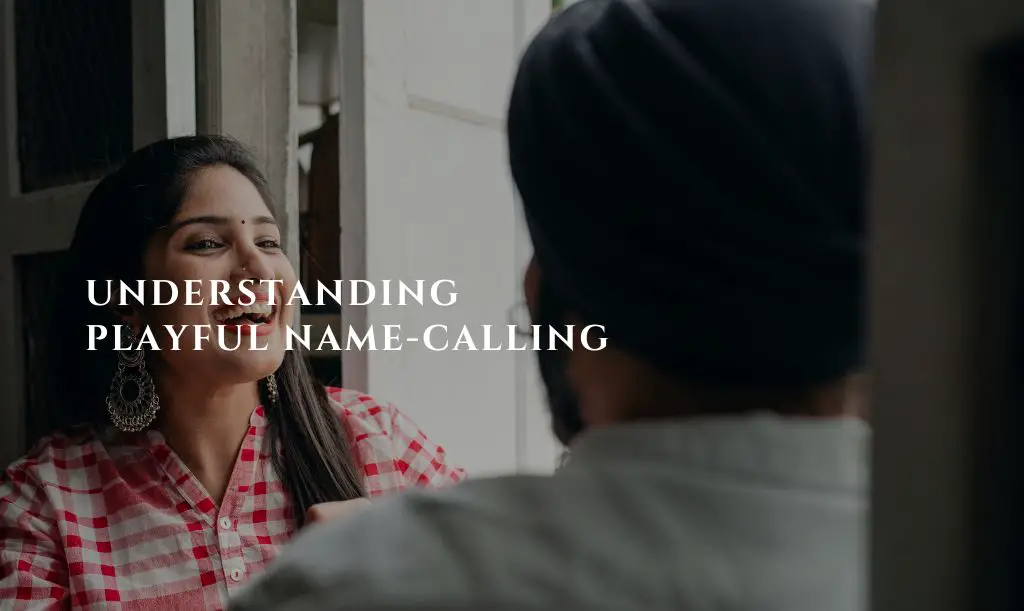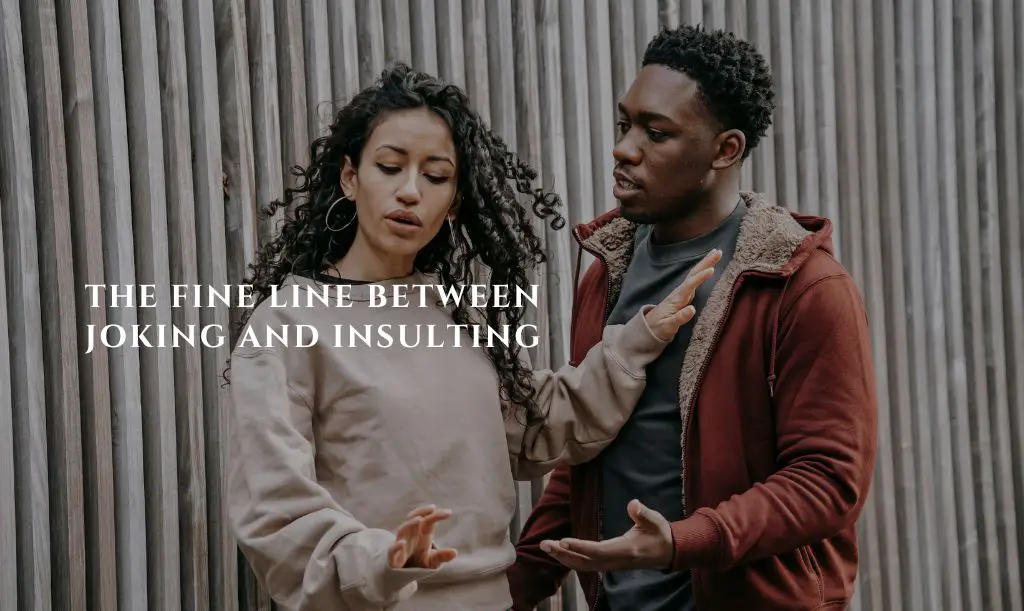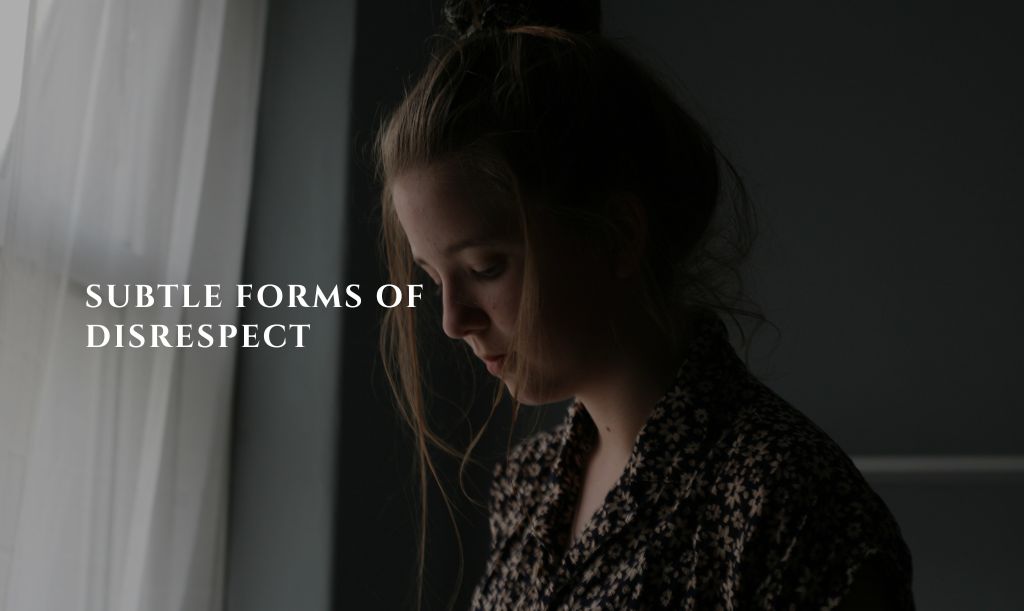‘My boyfriend calls me names jokingly. What does it mean?’
In every relationship, there exists an unspoken agreement – a tacit understanding that allows couples to engage in playful banter without fear or hesitation.
This interplay plays a crucial role in forging bonds, fostering familiarity, and creating lasting memories.
It can be seen as an expression of love, connection, and shared experiences.
Playful banter becomes the thread that weaves through the fabric of relationships.
It provides moments of joyous laughter and light-heartedness amid life’s trials and tribulations.
Partners often playfully tease one another about quirks or idiosyncrasies, turning these moments into cherished inside jokes that become part of their unique narrative.
My Boyfriend Calls Me Names Jokingly (When jokes cross the line)
However, as with any delicate performance on life’s stage, there is always a risk that jokes can overstep their boundaries.
What was once innocent jesting can quickly transform into hurtful remarks if not handled with care and sensitivity.
The line between harmless teasing and emotional harm can blur all too easily.
This brings us to question where exactly this fine line lies – when do these seemingly harmless jabs start becoming harmful?
When does it shift from being all in good fun to causing distress or even damaging self-esteem?
These are complex questions with no definitive answers as every person’s tolerance for such banter varies.
Understanding the dynamics of relationships and the subtle nuances of playful banter is crucial in navigating this territory.
It requires communication, empathy, and a willingness to reassess our actions and words when necessary.
Understanding Playful Name-Calling

The intricate workings of our minds and emotions come into play as we delve into the world of affectionate insults.
It may seem baffling to some, but there is a method to this madness.
Psychologically speaking, playful teasing taps into our innate desire for connection and bonding.
By engaging in light-hearted banter, we create a unique space where vulnerability and trust intertwine.
It’s a delicate dance between two individuals who understand that beneath the jests lies an unspoken language that strengthens their bond.
The Role Of Humor In Building Intimacy
Humor acts as the adhesive that binds couples together, allowing them to navigate life’s ups and downs with resilience and laughter.
When it comes to playful name-calling, humor plays a pivotal role in building intimacy.
In those moments when your partner affectionately refers to you as “silly goose” or “smarty pants,” there is an unspoken understanding that love resides within these seemingly trivial words.
Shared laughter creates a sense of belongingness and cements your connection on a deeper level.
Establishing A Shared Language Of Affectionate Insults
A shared language is the key that unlocks the door to an intimate relationship full of inside jokes and secret codes only you two understand.
Affectionate insults serve as linguistic markers within this shared language – they become terms of endearment unique to your relationship alone.
As strange as it may sound to outsiders, being called “my little troublemaker” or “my partner in crime” brings forth feelings of warmth and acceptance rather than hurt or offense.
It signifies an unbreakable bond, a mutual understanding that these playful names hold no malice or ill intent.
Instead, they serve as quirky reminders of the love and connection you share.
Remember, my dear reader, that the dynamics of relationships are complex and unique to each couple.
While playful name-calling may be an integral part of one relationship’s tapestry, it might not suit another.
The intricacies lie in understanding the boundaries and nuances within your own relationship, ensuring that affectionate insults remain just that – affectionate.
The Fine Line Between Joking and Insulting

In the realm of relationships, it is crucial to understand the fine line between harmless teasing and hurtful insults.
At times, what may start as innocent banter can quickly transform into a hurtful assault on one’s emotional well-being.
It is important to recognize when playful name-calling crosses that boundary, causing distress and undermining the very foundation of trust and respect within a partnership.
When our loved ones consistently resort to calling us derogatory names in jest, it can have a detrimental impact on our self-esteem and emotional well-being.
Words hold immense power; they have the potential to uplift or devastate.
Even if these remarks are intended as jokes, repeated exposure can chip away at our confidence, leaving us questioning our worthiness of love and acceptance.
We must take an honest look at how such name-calling affects our mental health and overall happiness.
Examining Power Dynamics Within Relationships
Playful name-calling is not just about the words themselves; it goes far deeper into the realm of power dynamics within relationships.
Often, these seemingly harmless jokes are rooted in imbalances of power—whether consciously or unconsciously.
When one partner consistently assumes the role of the jokester while the other becomes a mere target for ridicule, it creates an unequal distribution of control and influence within the relationship.
Such dynamics can erode trust, lead to resentment, and ultimately hinder healthy communication.
It is imperative that we reflect upon these aspects carefully before dismissing concerns raised by those who feel targeted by playful name-calling in their relationships.
Rather than brushing off their distress as hypersensitivity or lacking a sense of humor, we should strive to foster empathy and understanding.
Only by recognizing the potential harm caused by this type of behavior can we begin to address and rectify the imbalance of power that may lurk beneath the surface.
Communicating Boundaries and Expectations
In any relationship, open and honest communication is the cornerstone of a healthy partnership.
When it comes to playful name-calling, it is important to address any discomfort or unease it may cause.
It is essential to have a sincere conversation with your partner about your feelings regarding specific jokes.
Communicate calmly and assertively, expressing how certain names or comments make you feel.
Remember, this is not an attack on your partner’s character but an opportunity for both of you to grow together.
Setting up clear channels of communication allows both partners to express their needs and expectations freely.
Create a safe space where both of you can discuss concerns without fear of judgment or retribution.
This might involve establishing regular check-in sessions or implementing a code word signaling that a joke has crossed the line.
By having these mechanisms in place, you are fostering an environment where open dialogue thrives and respect flourishes.
Encouraging Empathy And Understanding Between Partners
Empathy plays a vital role in understanding each other’s perspectives within a relationship.
Encourage your partner to put themselves in your shoes and consider how they would feel if the tables were turned.
Help them understand the impact their words can have on your emotional well-being by sharing personal experiences or examples from outside the relationship.
Cultivating empathy fosters deeper understanding and creates room for growth as individuals and as a couple.
Remember, effective communication requires active listening from both parties involved in the discussion.
Encourage your partner to share their thoughts, concerns, and boundaries too so that there is mutual respect for each other’s feelings.
By fostering empathy and understanding between partners, you can build stronger foundations for a more respectful relationship that honors both individuals’ values and emotional well-being.
Subtle Forms of Disrespect

When it comes to playful name-calling in relationships, it is crucial to delve deep into the subconscious implications and hidden meanings behind seemingly harmless jests.
Words can carry immense power, no matter how innocently they are meant.
Behind those seemingly playful names lie layers of meaning that can impact one’s self-worth, perpetuate stereotypes, and even reinforce harmful societal norms.
It is imperative that we take a step back and critically examine the true intentions and implications behind these seemingly harmless labels.
Analyzing Underlying Stereotypes Or Prejudices In Jests
Let’s face it – jokes are often born out of stereotypes or prejudices deeply ingrained in our society.
Whether it’s based on gender, race, or culture, playful name-calling can unknowingly perpetuate harmful biases.
While some may argue that these jokes are purely innocent fun, we must acknowledge that they contribute to a culture where certain groups are marginalized or belittled.
By analyzing the underlying stereotypes or prejudices embedded within these jests, we can begin to challenge and dismantle these harmful narratives.
Addressing Gender, Racial, Or Cultural Insensitivity
It is time to address the elephant in the room – gender insensitivity cannot be ignored when discussing playful name-calling within relationships.
Too often do we witness derogatory terms used casually under the guise of “just kidding.” It is essential to recognize that words have consequences and using derogatory language based on someone’s gender not only disrespects their identity but also perpetuates gender inequality.
The same applies to racial and cultural insensitivity; using jokes founded on racial stereotypes serves only to amplify existing divisions and create an environment of exclusion.
Challenging Harmful Societal Norms Through Conversation
Change begins with conversation.
Engaging in open and honest dialogues about the harmful societal norms perpetuated by playful name-calling is crucial to fostering understanding and growth within relationships.
By challenging these norms, we can create space for empathy, respect, and equality.
It is through these conversations that we can educate ourselves and our partners about the impact of seemingly harmless jokes and work towards building a more inclusive, accepting, and compassionate environment.
It is imperative that we unmask the subtle forms of disrespect embedded within playful name-calling.
Seeking Professional Help if Needed

In the realm of relationships, it is essential to remember that no amount of jesting should ever mask or excuse emotional abuse.
While playful name-calling may seem harmless on the surface, it’s crucial to be vigilant for signs of manipulation and control.
Emotional abuse can manifest in subtle ways, often leaving victims questioning their own worth and sanity.
It is imperative to recognize patterns of behavior such as constant belittlement, gaslighting, or coercive tactics aimed at undermining one’s self-esteem or sense of autonomy.
When these red flags appear in the guise of playful banter, it is vital not to overlook their potentially harmful impact.
When faced with a situation where playful name-calling has crossed the line into emotional abuse, seeking professional help becomes paramount.
Therapists and relationship counselors possess the necessary expertise to navigate complex dynamics and provide valuable insights into establishing healthy boundaries within a relationship.
They offer a safe space for individuals to explore their emotions, process past trauma if present, and gain tools for effective communication.
These professionals can guide couples toward building healthier relationships free from toxic behaviors while fostering empathy, respect, and understanding between partners.
My Boyfriend Calls Me Names Jokingly: Conclusion
‘My boyfriend calls me names jokingly’
Navigating the delicate territory of playful name-calling in relationships requires careful consideration of its underlying dynamics.
While it can foster connection and intimacy when done with mutual respect and consent, there exists a fine line that should never be crossed into emotional abuse or harm.
As individuals involved in relationships where such banter is prevalent, we must remain vigilant in recognizing when these jokes turn toxic and seek professional help if needed.
By being conscious of our own boundaries while encouraging open dialogue with our partners about what crosses the line, we can foster healthier, more fulfilling relationships.
Remember, respect and kindness should always be at the forefront of our interactions.
Through self-reflection, empathy, and a commitment to growth, we can create an atmosphere of love and understanding where playful banter can thrive without causing harm.
Related Articles:
- https://lovebridgeguides.com/is-she-waiting-for-me-to-text-her/
- https://lovebridgeguides.com/my-boyfriend-is-not-masculine-enough/
- Does A Prom Date Mean Anything? (Answered!) - 20 February 2024
- Boyfriend Refers To Me In Third Person (Explained!) - 20 February 2024
- Is Sending Memes Flirting? Find Out Here! - 20 February 2024

